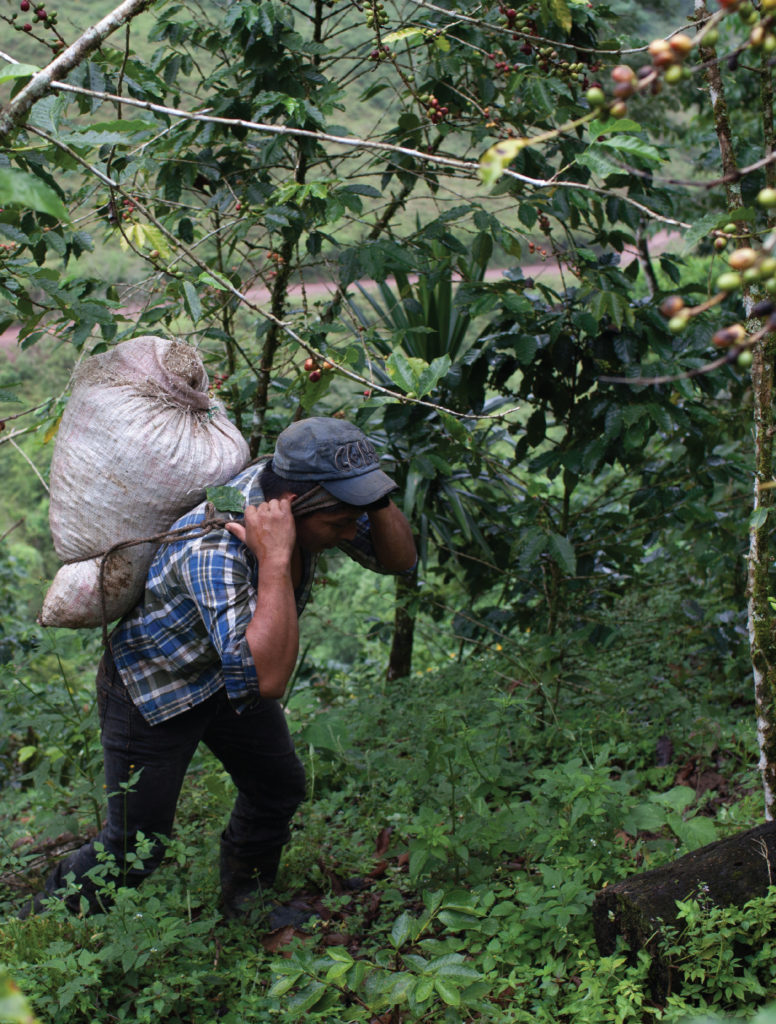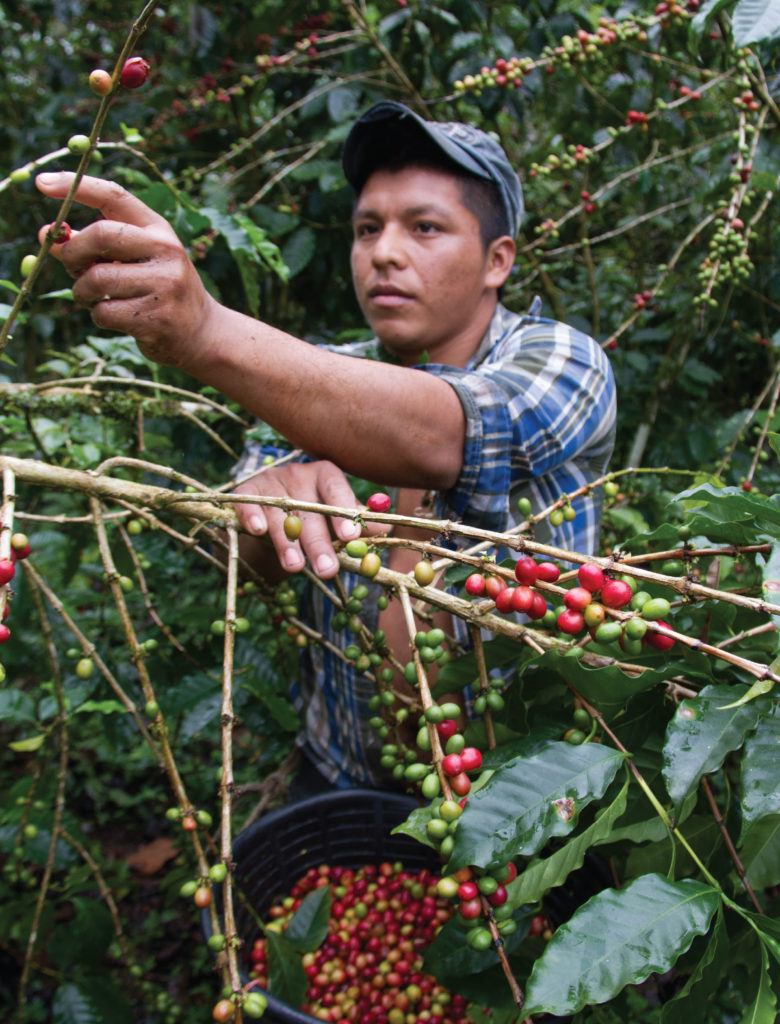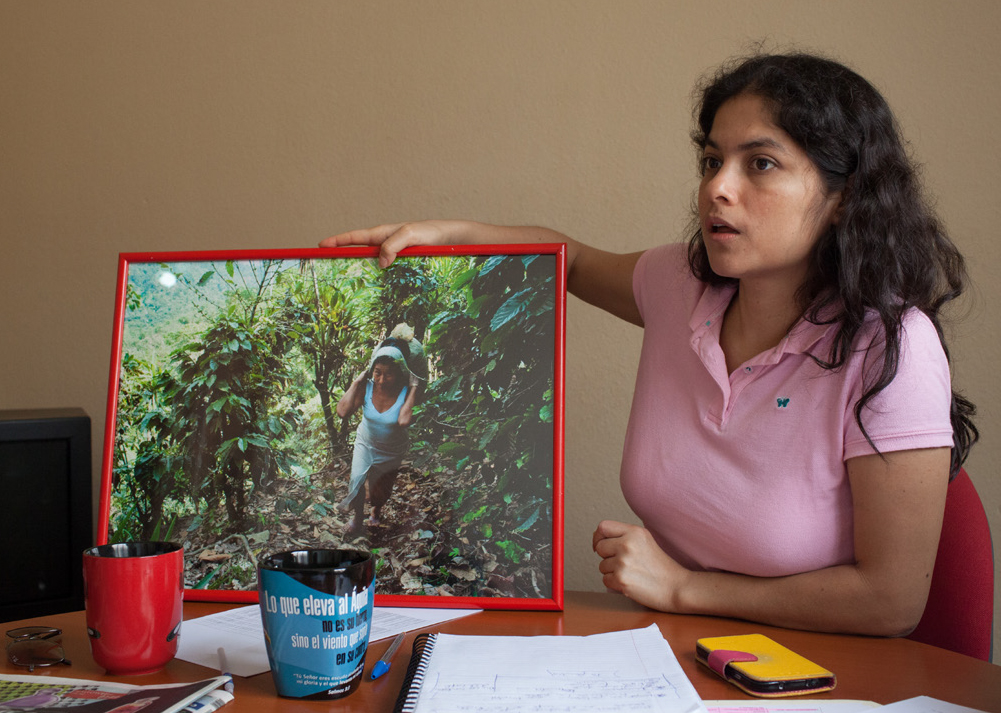Virtually none of the coffee workers in Guatemala are organised into unions. Attempts to demand their rights can cost workers their lives. Workers who complain disappear, and union members experience violence, receive death threats, and are forced into exile.
A young woman in traditional dress smiles shyly. She is with a group of fellow coffee workers who have come to a secure location in the city of Huehuetenango in western Guatemala.
How many of you are members of a union?
None of the coffee workers raises a hand.
“If we try to organise, we can be killed,” says a young man whose first language is a Mayan dialect called Mam. Several of the coffee workers say they know people who have been threatened and persecuted because they tried to organise.
According to the International Labour Organisation (ILO), about 2.5% of Guatemala’s workforce are union members, and the number is even lower for agricultural workers. One of Guatemala’s umbrella organisations for labour unions, MSICG, estimates that fewer than 0.1% of Guatemala’s coffee workers are organised.
“Working conditions in Guatemala are characterised by extensive violations of the law. By and large, out on the plantations, no one knows anything about unions or labour ministry inspectors,” says Jesper Nielsen, an international advisor at 3F.
Guatemala is one of the ten worst places in the world for workers
Because of armed attacks, murder, and a lack of due process, Guatemala is one of the ten worst countries in the world in which to be a worker, according to the ITUC. The countries are listed in alphabetical order.
Belarus: Discrimination – forced labour – repression of protests.
China: Discrimination – arrests – precarious work – lack of due process.
Columbia: Murder – collective bargaining undermined – discrimination.
Egypt: Police brutality – mass arrests – abductions.
Guatemala: Armed attacks – murder – lack of due process.
Pakistan: Large-scale exclusions of workers from labour law – arrests – violence.
Qatar: Migrants excluded from labour law – forced labour.
Saudi Arabia: Migrants excluded from labour law – forced labour.
Swaziland: Trade unions banned – police violence – imprisonment.
United Arab Emirates: Migrants excluded from labour law – forced labour.
Source: ITUC 2015
Workers banned
In 2015, Guatemala was named one of the ten worst countries in the world with respect to poor working conditions and disregard for labourer’s rights, according to the International Trade Union Confederation (ITUC).
“We try to organise the coffee workers,” says Lesbia Amézquita, legal counsel for MSICG, “but it’s very hard, because they risk being fired, killed, or thrown in prison.”
The right to form and join a union is enshrined in Guatemalan law, but even so, in the coffee workers’ experience, it is impossible to organise or complain of harsh conditions on the plantations.
“Plantation owners don’t want people to complain. If you find fault with something, you’re thrown out and told never to show your face again,” says a 53-year-old coffee worker in a blue shirt.
He knows a coffee worker that tried to complain about the conditions on a plantation, and who was thrown out as a result.
“The following year, he returned to the plantation to work, but after a week the security guards recognised him. They took him away, and no one has seen him since,” says the man in the blue shirt.
According to José Chic, a member of the labour union Comité Campesino del Altiplano, workers who try to complain about conditions are banned from working on any plantations.
“The workers are hired via a middleman, who will make sure not to take on anyone who has caused trouble in the past,” says José Chic.
No contracts or pay slips
Because the workers are not organised, they often have nothing but a verbal agreement with the plantation owner to establish the terms of their employment.

Fewer than 0.1% of Guatemala’s coffee workers belong a union, according to MSICG, one of the country’s umbrella organisations for labour unions. Photo: James Rodríguez.
“There are no contracts. In any case, most of the workers neither read nor write. But sometimes they are told to put their fingerprint on a blank sheet of paper that the plantation owner can then fill out any way he likes,” says Lesbia Amézquita from MSICG.
The workers are usually paid in cash, and receive no pay slip that details how their wages were calculated.
“They just shout out your name and give you the money. Often you don’t get the right amount, but there’s nothing you can do,” says a female coffee worker.
She continues, “I’m not so good at figures, and I’m just glad to get paid, even though it’s not much. But if I feel the pay is wrong, there’s nothing I can do about it.”
Plantation owners: We respect unions
Danwatch contacted Anacafé, the coffee plantation owners’ trade organisation in Guatemala, to ask whether it can guarantee that employees on its members’ plantations receive contracts and pay slips, and to ask for its reaction to workers’ fears of being fired, threatened, attacked or killed if they try to form unions.
Anacafé did not directly respond to these questions, but in a written reply stated that it educates coffee plantation owners in subjects related to the protection of labourer rights, like employment contracts and wage payment.
The organisation went on to say, “The coffee sector respects both the right to organise and to form unions as well as workers’ rights to choose the type of organisation they prefer.”

According to the trade organisation for coffee plantation owners in Guatemala, Anacafé, the coffee sector respects the right to organise and form unions. Photo: James Rodríguez.
.
Union representatives risk their lives
In the meantime, the unions that are trying to change conditions for Guatemalan coffee workers are under enormous strain.
Lesbia Amézquita of MSICG describes how she has gone through periods when she has been followed by unmarked cars and motorcycles. Once a car tried to hit her. Finally, the pressure became so intense that she moved to Chile for a few months until things settled down and she could return home.

Lesbia Amézquita, a lawyer with the workers’ rights organisation MSICG, went to live in exile for a time because she felt threatened. Photo: James Rodríguez.
The International Trade Union Federation has characterised Guatemala as the most dangerous country in the world in which to be a union official.
“Many union leaders have been murdered,” says Jesper Nielsen, an international advisor at 3F. He explains that both union representatives and their families have been threatened and physically attacked.
According to the ITUC, at least 53 union representatives were murdered in Guatemala between 2007 and 2013. Since then, at least 7 more have been killed. Many more have been threatened and attacked.